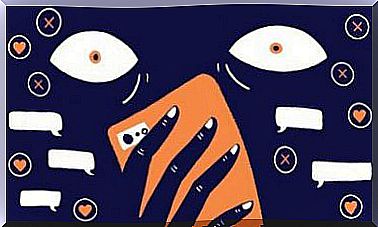Discovering Our “blind Spots ” In Love
Sometimes we do it, we throw ourselves into the void with closed eyes and open hearts, anxious at the idea of loving and being loved. Sometimes everything is fine … other times, on the contrary, no. Because we are victims of these blind spots to which we firmly cling to high-cost relationships, impossible loves; this is where self-deception weaves a magnificent spider’s web that you get caught in.
To understand what these blind spots actually are, we will start by doing a little experiment. Close your eyes for a few seconds and then open them to direct your gaze to a window, letting sunlight flood your face for a few seconds.
Now keep your gaze on one point. You won’t notice it, but in your retina there are photoreceptors, tiny nerve cells that will pick up this light and send information to the brain, in an almost priceless instant.
However, we must not forget that in our retina there is a small area where there are photoreceptors, also known as blind spots. Since the eye does not pick up any stimulation, it is normal that we all see our reality with small white fragments coming from these blind spots. However, our view does not lose any detail, it is perfect, wonderful to bring us every nuance of a face, of a landscape …
How is that possible then? If there is an empty area, a blind area in our retina, how can we see the world so clearly? The answer is as simple as it is worrying: the brain is in charge of “filling” the gaps. As curious as it may seem, in the psychological field the same thing happens. There are realities around us that we cannot see. These are areas in white, generally negative facts that fade like a slight haze on the horizon of our conscious world.
The brain is the new one that takes control by selecting the information around us through a filter. Thanks to it, negative perceptions are attenuated by putting a wall in front of the attention and thus minimizing the impact of disappointments. This fine art type of self-deception is especially common in the world of emotional relationships. We will tell you about this in the rest of this article …
“My mate is neither domineering nor jealous, in fact, he worries about me and loves me very much”.
From the outside, for the most part, it is not easy to see what is behind these realities which sometimes disagree with us, and sometimes hurt us in front of our life and our ears. However, anyone who lives immersed in their blind spots neither notices them nor squeezes them nor wants to see them.
These are his buoy, his pain reliever, his wooden board allowing him to stay upright in the face of a reality that sometimes drowns. Because the trick of self-deception is the most sophisticated strategy that a human being, thanks to it we suffocate the smoke of stress, and we launch through the pipes of unconsciousness worries and fear. responsibility itself to act in the face of an obvious problem.
This mental haze generated by blind spots always sets in motion the most complex psychological strategies such as classic refusal, rationalization or selective attention, hence the fact that we focus only on what interests us but ignoring the rest.
As Machado said, and he was right, there is something much worse than seeing reality in black, and that is not seeing it at all. This is undoubtedly a very common fact when one is afraid of the field of affections and of this vast labyrinth of love where it will always be better to “not see” than to “lose” the loved one.
Robert Trivers is a sociobiologist and anthropologist well known for his work on self-deception. According to him, this refined strategy, which humans practice so much, is something more sophisticated than the simple lie. In this sense, the act of lying to oneself requires a deeper, more delicate architecture.
Moreover, when we manage to keep the proof relegated to the unconscious and the lie to the conscience, the cognitive cost is immense. This effort to make everything credible to us no doubt makes blind spots into real traps in which to remain caught, or to be victims of ourselves.
If we now wonder how to illuminate these mental corners of the person who practices them for a long time with his / her companion, it must be said that it is difficult. When you try to open your eyes to who is in love, most likely rejection and rejection will arise.
This is why before we ourselves fall into similar mental strategies when what we can experience is a real attack on our integrity, our self-esteem and our values, we must try to control the blind spots. most common ones that come into practice in a relationship. Here are some examples :
- We should not fall into the most common exercise of any couple relationship: idealization.
- You have to see the person as they are, without anesthesia, without sweeteners. We must not overestimate what pleases us, nor oversize those aspects that we appreciate to compensate for what makes us uncomfortable, what makes us out of tune, what hurts us.
- Do not distort reality by recreating ideas that do not correspond to what surrounds us, to what we see and what we feel.
- Let us not forget that love has its conditions, and that we must not postpone the disappointment that we feel today until tomorrow.
To conclude, it should be remembered that the use of blind spots occurs with excessive frequency within couple relationships based on dependence. It is in this type of interpersonal sphere that we have the most tendency to distort reality in order to maintain the common life, with the idea of maintaining this impossible balance without perceiving the emotional and psycho-social effects that that. implied.
As Albert Camus once said, “the truth, like the light, blinds. Lies are like a beautiful twilight which enhances every object… ” Let us therefore avoid living in this twilight which finally precedes agony, and let us have the courage to open our eyes to the truth.









